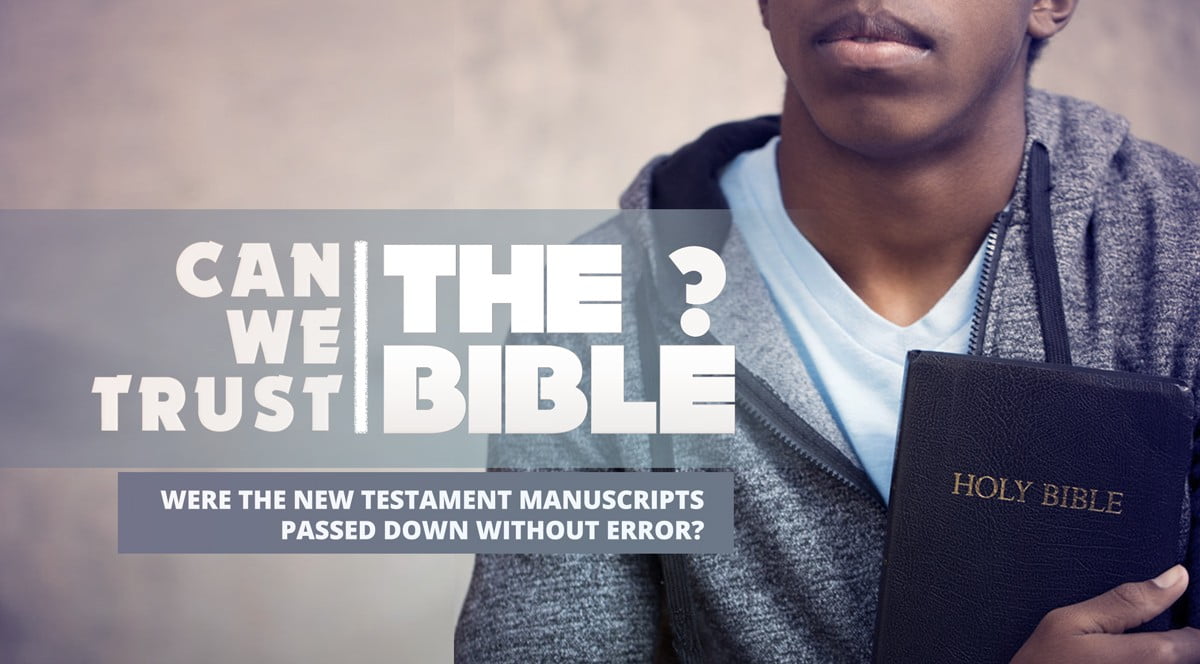
The Old Testament contains 39 books in total, spanning from the book of Genesis (written by Moses around 1405BC) to the book of Malachi (written by Malachi around 430BC). The important thing to recognize about the Old Testament is that by the time of Jesus Christ (0 – 5AD), all 39 books of the Old Testament were written and accepted in the Jewish community, though they did not call it the “Old Testament” as we do, rather the “Tanakh”. You see, the Hebrew Bible or the “Tanakh” and the Christian Old Testament are identical in content! Yes, the Tanakh has 24 books while the Old Testament has 39, but careful examination of those 24 books will reveal that the content is one and the same, just divided and ordered differently. Click here to see comparison table
This is important, for it means that the very people (the Jews) who received the Old Testament from God and wrote it down, and read it aloud, and taught it as history to their children, and preserved it in times of war, and tore their clothes when convicted by its words, and even discovered in it the promise of a Messiah…these people, the Jewish people, independent of Christianity (remember, Judaism is an entirely different faith) attest to the completeness of our Christian Old Testament canon…isn’t that amazing?
But there’s even more proof that the 39 books of our Old Testament are from God and complete (that is, nothing is missing that should be in it, and nothing is extra that shouldn’t be in it). Firstly, Jesus treated the Old Testament as written by God and complete; see what He says in Matthew 5:17-18: “Do not think that I have come to abolish the Law or the Prophets; I have not come to abolish them but to fulfill them. For truly, I say to you, until heaven and earth pass away, not an iota, not a dot, will pass from the Law until all is accomplished.”
If this is not enough, the authors of the New Testament (note: the earliest Christians and eyewitness apostles who began the church itself) quote the words of the Old Testament over 300 times! In fact, 31 of the 39 books of the Old Testament are directly quoted in the New Testament…that’s 80% of the Old Testament books! These quotations often start with phrases like “it is written”, “Scripture says”, or “God says”; no other books or writings from non-biblical authors are quoted this way by the early church. What’s the point? The earliest Christians in the New Testament church unquestionably viewed the Old Testament as being written by God and complete.
The Problem of the Apocrypha
That brings us to the most common opposition to our claim that the Old Testament is written by God and complete: the Apocrypha. Many skeptics will challenge the Christian like this: “You say the Bible is the Word of God and is true from cover to cover…but be honest with me, isn’t it true that Christians can’t even agree on how many books are in the Old Testament? Don’t catholic bibles have 14 extra books that are missing from your Bible? How can you be sure you’ve got the complete Word of God? How did the church even decide which books were legitimately from God and which were not?”
To be sure, there is a collection of 14 writings or books that were written by various non-prophet authors after Malachi and before the New Testament collectively referred to as the “Apocrypha” (which means “hidden away”). Today you will find that some bibles (ex. catholic) include these 14 books while others (including translations such as the NASB, ESV, KJV, NKJV, and NIV) don’t. This has always been a beloved point for critics of the Bible, but to be clear: the 14 books of the Apocrypha are NOT part of the true Old Testament canon written by God, and Christians must be equipped to assert this.
The first and most important reason we do not include the Apocrypha in our Old Testament is because the original Hebrew Tanakh from which our Old Testament is translated does not include these 14 books; it only comprises the 24 books mentioned earlier (see table above). So where did these extra books originate from? Around 200BC, in a Greek translation of the Hebrew Tanakh, called the “Septuagint”, the apocrypha made it’s first appearance. Although these extra books were present at the time of Jesus, it is monumental to note that:
- Jesus never once in His earthly life acknowledged any of the 14 extra books
- The New Testament authors and apostles did not quote from them
- Even the first century Jews did not consider them as Scripture; listen to what the Jewish historian Josephus had to say: “From Artaxerxes to our own times a complete history has been written, but has not been deemed worthy of equal credit with the earlier record, because of the failure of the exact succession of the prophets” (Against Apion 1.41). What is Josephus saying? The Jewish people were aware of the 14 books of the apocrypha but yet considered these writings as “not worthy of equal credit” and not all written by true prophets, as compared to the earlier record, that is, the Tanakh or our Old Testament.
- If that’s not enough, the Talmud (a collection of early Jewish Rabbi teachings) also tells us that no more prophetic writings had been given after the time of the last Old Testament prophets Haggai, Zechariah, and Malachi (see Babylonian Talmud).
Given all the evidence, the curious mind may wonder how these 14 extra books continue to pop up in modern translations of the Bible. The answer to that involves a bit of history, but in brief: an early church leader by the name of Jerome created the first Latin translation of the Old Testament (called the “Latin Vulgate”); when creating this translation, Jerome utilized the Greek Septuagint (that early Greek translation of the Tanakh which included the apocrypha) as opposed to exclusively using the original Hebrew Tanakh (which does not include the apocrypha). Sadly, the Latin Vulgate would go on to become the predominant Bible translation of one of the biggest denominations on earth, the Roman Catholic church. At the Council of Trent (1545–1563) the RCC officially elevated the apocrypha to equal standing with the rest of the authentic 39 Old Testament books.
And herein lies the fundamental concern we must grapple: does the church have the power to determine which books are Scripture? Or can the church only recognize what God has already determined is Scripture? The distinction may seem subtle at first, but it is of paramount importance. Believers must appreciate what Jesus says in His own words: “My sheep hear my voice, and I know them, and they follow me.” (John 10:27)
So Christian beware, as the 14 books of the apocrypha are far from benign or harmless! In the pages of these extra books you will find doctrines which differ greatly from the rest of God’s Word, including support for unbiblical beliefs such as purgatory and indulgences for the forgiveness of sin! As God’s flock, we must all listen carefully to discern if what we read in our Bible be indeed the voice of our Shepherd!
In conclusion, the Old Testament you hold today is, beyond any reasonable doubt, written by God and complete. It contains the full collection of books God wanted you and I to possess, nothing more and nothing less, undisputed by the Jews who recorded them, the apostles who quoted them, the early church and us who recognize them, and Jesus himself who canonized them.





Leave A Comment